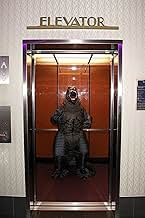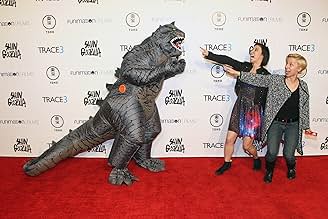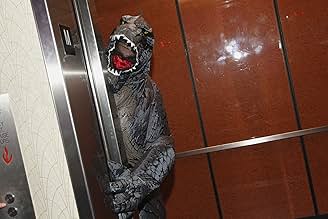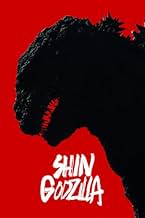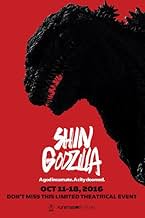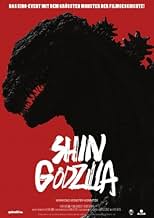Le Japon est plongé dans le chaos après l'apparition d'un monstre géant.Le Japon est plongé dans le chaos après l'apparition d'un monstre géant.Le Japon est plongé dans le chaos après l'apparition d'un monstre géant.
- Réalisation
- Scénario
- Casting principal
- Récompenses
- 13 victoires et 10 nominations au total
Avis à la une
The film takes a somber, serious tone as to what would happen if Japan were attacked -- in this case, by a seemingly unstoppable foe.
At present in Japan, there is an ongoing debate as to whether or not Japan should amend it's constitution to allow for an offensive military and this Godzilla film plays to exactly how powerless Japan would be in making it's own decisions during an attack of any kind. The reality is that the Japanese Prime Minister would have to ask for permission from the United States President before making an offensive move against a foreign threat and this film plays to that hard reality.
This new Godzilla starts out as an homage to its former man in a monster suit so that when you first see Godzilla, you'll disbelieve what you're seeing, but this Godzilla evolves into something majestic and utterly awe inspiring in its power.
What's more, this film makes it clear people die. In the Japanese release there's a lot of word play about how the government officials up high (on the fifth floor) make decisions that get passed down to people on lower floors that eventually hurt the people. I'm not sure how much will be translated, but the film is deliberately showing the disconnect between the political and day to day realities.
Overall, the performances are good. There is one character who they, for whatever reason, decided to make speak English in odd an inappropriate times.
This isn't a film for US audiences. The aesthetics will turn off a lot of non-Japanese young people accustomed to CG reality. But if you're open to learning about another culture, this is an excellent film, one of the best kaiju-films you'll ever see.
At present in Japan, there is an ongoing debate as to whether or not Japan should amend it's constitution to allow for an offensive military and this Godzilla film plays to exactly how powerless Japan would be in making it's own decisions during an attack of any kind. The reality is that the Japanese Prime Minister would have to ask for permission from the United States President before making an offensive move against a foreign threat and this film plays to that hard reality.
This new Godzilla starts out as an homage to its former man in a monster suit so that when you first see Godzilla, you'll disbelieve what you're seeing, but this Godzilla evolves into something majestic and utterly awe inspiring in its power.
What's more, this film makes it clear people die. In the Japanese release there's a lot of word play about how the government officials up high (on the fifth floor) make decisions that get passed down to people on lower floors that eventually hurt the people. I'm not sure how much will be translated, but the film is deliberately showing the disconnect between the political and day to day realities.
Overall, the performances are good. There is one character who they, for whatever reason, decided to make speak English in odd an inappropriate times.
This isn't a film for US audiences. The aesthetics will turn off a lot of non-Japanese young people accustomed to CG reality. But if you're open to learning about another culture, this is an excellent film, one of the best kaiju-films you'll ever see.
'Shin Godzilla' isn't Toho's vainglorious attempt at re-capturing the success of recent Hollywood adaptations of its iconic Japanese monster. Quite the contrary, co-directors Hideaki Anno and Shinji Higuchi know better than try to outdo their Western counterparts in terms of spectacle, and instead have made the astute decision to make a distinctly Japanese 'Godzilla' that will most certainly resonate with their home audience, even at the expense of alienating some non-Japanese viewers without the same cultural or historical context. In fact, we dare say that their film has the unique distinction of being both political allegory as well as real-world horror, and is surprisingly effective on either count.
No other recent event has been so seared in the Japanese consciousness as that of the 2011 Tohoko earthquake and tsunami as well as the consequent Fukushima nuclear disaster, not just because of the hundreds of thousands of people affected but also because it exposed how terribly unprepared the Japanese government was with handling a crisis of such proportions. The parallels here are unmistakable – from an indecisive Prime Minister (Ren Ôsugi) to the frustratingly bureaucratic attitude of his Cabinet ministers to the embarrassing revelation of his poor judgment (such as during a live press conference where Godzilla makes landfall right after he specifically tells the people that the creature will not) – and indeed meant no less than a searing indictment of just how inept the Naoto Kan's administration was during 3/11.
Yet it isn't hard to imagine how a movie based solely on such criticism would quickly turn monotonous, not least because the lead characters here are all political/ Government figures – among them, Hiroki Hasegawa's outspoken and gutsy Deputy Chief of Cabinet Secretary Rando Yaguchi, Yutaka Takenouchi's opportunistic Aide to the Prime Minister Hideki Akasaka, and Satomi Ishihara's Special Envoy for the United States Kayoko Ann Patterson – and each is defined only in terms of his or her role and ambition in relation to the ongoing calamity. None too subtle is the point, emphatically and unequivocally made, that while politicians wield the ingenuity and authority it takes to manage an unprecedented catastrophe, each is also simultaneously weighting the cost or opportunity of every decision or maneuver to his or her political futures.
Just as illuminating, especially to the Japanese, is the strengths or limits of its military might post-WWII, seeing as how it has never yet seen the need to invoke the use of its Self-Defense Forces (SDF) or call in the help of the US military under the US-Japan Security Treaty. Under the pretense of exterminating Godzilla, Anno's screenplay imagines what it would take not just for the SDF to be activated but also how US intervention would likely come with some strings attached. How and if at all it is meant to play into the current Shinzo Abe's push for an expansion of the SDF role is quite perceptively left up to the audience's interpretation, but there is no doubting that the introduction of the United Nations late into the film is meant to demonstrate how powerless nations not on its Security Council may be to resolutions passed by its five members on non-member countries.
Yes, if it isn't yet clear, there is no intent here to highlight the human dimension of such an event; rather, it is domestic politics as well as the global world order that forms the basis of this re- incarnation of Godzilla. As a reboot, 'Shin Godzilla' starts on a clean slate, beginning with an underwater disturbance that briefly makes its way onto shore before going back out to sea, then returning as a much more highly evolved organism that grows and grows ever more fearsome. Fans though will not be disappointed – as with past iterations of Godzilla, this latest version not only has the ability to radiate highly destructive atomic rays from its dorsal fins, it also can set streets of buildings ablaze by spewing fire out of its mouth. It does take time to get used to the new 'ShinGoji' design, but rest assured that this beast is every bit as terrifying as it should be.
In fact, that palpable sense of fear is twofold – first, in tying the origins of Godzilla to Japan's ignominious nuclear history; and second, in showing with utmost realism the wanton destruction of notable landmarks in Tokyo by the monster. The former has to do as much with the United States' alleged dumping of radioactive waste in Tokyo Bay in the 1950s and 1960s as accusations of Japan's own disposal of toxic ash from the burning of Fukushima's nuclear waste into the same waters. The latter, on the other hand, sees entire districts in Tokyo ripped or flattened by Godzilla's rampage, impressively staged by co-director cum VFX supervisor Anno (also known for last summer's 'Attack of Titan') using a mix of old- fashioned puppetry and modern CGI. In particular, the combined US- Japan military assault on Godzilla along the banks of the Kano River and the finale in downtown Shinjuku is stunning, especially in imagining the magnitude of destruction that Godzilla could inflict on modern-day Japan.
Yet if the promotional materials have given the impression that 'Shin Godzilla' is an action-packed blockbuster like its most recent Hollywood predecessors, you'll do best to temper those expectations. Sure, there are beautiful sequences of Godzilla wreaking havoc, but because the focus is on displaying different types of political personalities and their responses towards such a crisis of proportions, there is a lot of talking (as well as 'talking heads') throughout the film and especially in the beginning. By tapping into the paranoia, fear and frustration of their fellow Japanese following their own recent real-life crises, Anno and Higuchi have made a contemporary 'Godzilla' that is sure to roar loud with their home crowd – and by that count, this is as its Japanese title suggests, a new and true incarnation as relevant as it is frightening.
No other recent event has been so seared in the Japanese consciousness as that of the 2011 Tohoko earthquake and tsunami as well as the consequent Fukushima nuclear disaster, not just because of the hundreds of thousands of people affected but also because it exposed how terribly unprepared the Japanese government was with handling a crisis of such proportions. The parallels here are unmistakable – from an indecisive Prime Minister (Ren Ôsugi) to the frustratingly bureaucratic attitude of his Cabinet ministers to the embarrassing revelation of his poor judgment (such as during a live press conference where Godzilla makes landfall right after he specifically tells the people that the creature will not) – and indeed meant no less than a searing indictment of just how inept the Naoto Kan's administration was during 3/11.
Yet it isn't hard to imagine how a movie based solely on such criticism would quickly turn monotonous, not least because the lead characters here are all political/ Government figures – among them, Hiroki Hasegawa's outspoken and gutsy Deputy Chief of Cabinet Secretary Rando Yaguchi, Yutaka Takenouchi's opportunistic Aide to the Prime Minister Hideki Akasaka, and Satomi Ishihara's Special Envoy for the United States Kayoko Ann Patterson – and each is defined only in terms of his or her role and ambition in relation to the ongoing calamity. None too subtle is the point, emphatically and unequivocally made, that while politicians wield the ingenuity and authority it takes to manage an unprecedented catastrophe, each is also simultaneously weighting the cost or opportunity of every decision or maneuver to his or her political futures.
Just as illuminating, especially to the Japanese, is the strengths or limits of its military might post-WWII, seeing as how it has never yet seen the need to invoke the use of its Self-Defense Forces (SDF) or call in the help of the US military under the US-Japan Security Treaty. Under the pretense of exterminating Godzilla, Anno's screenplay imagines what it would take not just for the SDF to be activated but also how US intervention would likely come with some strings attached. How and if at all it is meant to play into the current Shinzo Abe's push for an expansion of the SDF role is quite perceptively left up to the audience's interpretation, but there is no doubting that the introduction of the United Nations late into the film is meant to demonstrate how powerless nations not on its Security Council may be to resolutions passed by its five members on non-member countries.
Yes, if it isn't yet clear, there is no intent here to highlight the human dimension of such an event; rather, it is domestic politics as well as the global world order that forms the basis of this re- incarnation of Godzilla. As a reboot, 'Shin Godzilla' starts on a clean slate, beginning with an underwater disturbance that briefly makes its way onto shore before going back out to sea, then returning as a much more highly evolved organism that grows and grows ever more fearsome. Fans though will not be disappointed – as with past iterations of Godzilla, this latest version not only has the ability to radiate highly destructive atomic rays from its dorsal fins, it also can set streets of buildings ablaze by spewing fire out of its mouth. It does take time to get used to the new 'ShinGoji' design, but rest assured that this beast is every bit as terrifying as it should be.
In fact, that palpable sense of fear is twofold – first, in tying the origins of Godzilla to Japan's ignominious nuclear history; and second, in showing with utmost realism the wanton destruction of notable landmarks in Tokyo by the monster. The former has to do as much with the United States' alleged dumping of radioactive waste in Tokyo Bay in the 1950s and 1960s as accusations of Japan's own disposal of toxic ash from the burning of Fukushima's nuclear waste into the same waters. The latter, on the other hand, sees entire districts in Tokyo ripped or flattened by Godzilla's rampage, impressively staged by co-director cum VFX supervisor Anno (also known for last summer's 'Attack of Titan') using a mix of old- fashioned puppetry and modern CGI. In particular, the combined US- Japan military assault on Godzilla along the banks of the Kano River and the finale in downtown Shinjuku is stunning, especially in imagining the magnitude of destruction that Godzilla could inflict on modern-day Japan.
Yet if the promotional materials have given the impression that 'Shin Godzilla' is an action-packed blockbuster like its most recent Hollywood predecessors, you'll do best to temper those expectations. Sure, there are beautiful sequences of Godzilla wreaking havoc, but because the focus is on displaying different types of political personalities and their responses towards such a crisis of proportions, there is a lot of talking (as well as 'talking heads') throughout the film and especially in the beginning. By tapping into the paranoia, fear and frustration of their fellow Japanese following their own recent real-life crises, Anno and Higuchi have made a contemporary 'Godzilla' that is sure to roar loud with their home crowd – and by that count, this is as its Japanese title suggests, a new and true incarnation as relevant as it is frightening.
If you are expecting a stereotypical monster movie you will be disappointed. This film is definitely much more of a political thriller than a monster flick.
The movie is filled with plain and mostly forgettable characters, however, collectively they make the real protagonist of the film: Japan. The film critiques and parodies a dysfunctional bureaucracy, allowing for some not so subtle irony and other comedic moments using techniques such as extreme close-ups, quick changes in POV's, rapid-fire dialogue to reinforce these while still allowing for suspense when needed. Its overly fast pace is a bit jarring at times, making it hard to concentrate with its many fast and transitionless cuts.
Shin Godzilla feels very much like a documentary, with convincing this-is-really-happening atmosphere. The filmmakers really make you feel like a participant and witness to the events happening throughout the film engrossing you into the universe and adding a huge sense of realism which adds to the political side of the film and the impact of the destruction.
Godzilla himself is also amazing, the combination of puppeteering, animatronics and digital effects create such a unique portrayal of the monster evoking terror and intrigue. Though, the cgi isn't always perfect, but this can be overlooked.
The ending is also a mixed bag, it has a great message of collaboration and ends with an interesting introspection on who the bigger monster is: humanity or Godzilla. However it did feel too cheap and easy which kinda diminished the realistic tone set by the film.
The movie is definitely not perfect but its multi layered symbolism and message are so interesting I couldn't help but be invested throughout the whole thing.
The movie is filled with plain and mostly forgettable characters, however, collectively they make the real protagonist of the film: Japan. The film critiques and parodies a dysfunctional bureaucracy, allowing for some not so subtle irony and other comedic moments using techniques such as extreme close-ups, quick changes in POV's, rapid-fire dialogue to reinforce these while still allowing for suspense when needed. Its overly fast pace is a bit jarring at times, making it hard to concentrate with its many fast and transitionless cuts.
Shin Godzilla feels very much like a documentary, with convincing this-is-really-happening atmosphere. The filmmakers really make you feel like a participant and witness to the events happening throughout the film engrossing you into the universe and adding a huge sense of realism which adds to the political side of the film and the impact of the destruction.
Godzilla himself is also amazing, the combination of puppeteering, animatronics and digital effects create such a unique portrayal of the monster evoking terror and intrigue. Though, the cgi isn't always perfect, but this can be overlooked.
The ending is also a mixed bag, it has a great message of collaboration and ends with an interesting introspection on who the bigger monster is: humanity or Godzilla. However it did feel too cheap and easy which kinda diminished the realistic tone set by the film.
The movie is definitely not perfect but its multi layered symbolism and message are so interesting I couldn't help but be invested throughout the whole thing.
Japan is back in the game with their very own new Godzilla movie SHIN GOJIRA. Where Hollywood revived Godzilla as a tribute to his more heroic role in the late-showa era "versus" movies and the Heisei era, Toho Japan has gone back to the roots of the 1954 original Gojira and crafted a modern thriller about the horrors of mankind's misdeeds, the inaction of a government embroiled in bureaucracy and the impotence of a military in the face of this fiercer, meaner, force of nature Godzilla. .
SHIN GODZILLA is likely the first Godzilla movie to focus squarely on the political scene within the government when a giant monster attacks. Past movies have always involved Scientists, soldiers, or civilians focusing on the chaos on the ground. This movies looks into the chaos at the top as we follow young civil servant Yaguchi, deputy chief cabinet secretary (the first in a long list of designations to come).
A regular day in the government is interrupted by the collapse of the Tokyo bay aqua line tunnel and mysterious attacks off the coast of Japan. While the aged officials hold fruitless meeting after meeting in an obvious parody of real life bureaucratic process, Yaguchi theorists that the disasters are caused by a living creature.
No sooner is his theory shot down than an enormous tail rises out of the water. As the government scrambles but always falling a step behind the escalating disaster, Yaguchi forms a task force of unorthodox civilian experts to figure out how to stop this creature.
As the government's tried and tested efforts become increasingly futile, USA sends a special envoy Kayako Ann Patterson with the promise of military aid and insider knowledge to this mysterious creature dubbed "Godzilla".
The creature is growing, mutating, and taking on increasingly dangerous characteristics. Yaguchi's team is forced to think outside the box for a new way to halt its rampage before the UN deploys nuclear weapons on Japanese soil.
Contrary to the trailers, this is not the dark depressing disaster movie that was promised. Instead we are treated to one of the smartest and most biting social and political satires in modern cinema. Right in the crosshairs is the inefficient bureaucratic processes of the government and their obsession with trivial minutia which results in a complete mishandling of the crisis posed by the constantly evolving Godzilla.
The satire comes in the fact that the film does not overly dramatize anything; what you see is as close to reality as one can get in an old fashion parliamentary government like Japan's. Each ministry out for itself, passing the buck wherever possible, defending only their own interests. Standard procedures take precedence over unconventional methods.
Scenes of the prime minister making an announcement of Godzilla not being able to come ashore, intercut with the revelation that not only has the creature made landfall but has started trashing the town, hearkened back to the perceived mishandling of past real life disasters in Japan.
Yet the message underlying this movie is not a strict criticism of the government but an affirming call to action aimed at a new generation of leaders to unite a nation. Where the traditional methods fail, innovation and initiative will be the true weapons of the future. Yaguchi and his team represent this perfectly; outcasts from their respective fields because of their unconventional ideas.
Their tenacity in the face of hopeless defeat soon inspires fellow citizens from all walks of life, engineers, mechanics, construction workers and other blue collar roles typically overlooked by a status obsessed people, to come together and stand against a God incarnate.
The titular monster is unlike any incarnation ever seen. It's keloid looking skin, seemingly torn in places, gives the impression of pure suffering. Yet his inhuman all staring eyes betray a being devoid of soul. It is as it was back in 1954; a soulless unstoppable force birthed from mankind's sins. The military is powerless, though not for a lack of trying.
Where previous Godzilla movies have shown the military in a less than flattering light (cowardly, incompetent, or unable to hit such a massive creature), SHIN GODZILLA shows a military force truly giving their all, only hampered by slow indecision from the top.
The special effects used to bring this colossus to life is arguably good. No where near Hollywood blockbusters but amazing once you consider the comparatively tiny budget Toho had to work with. The naturalistic direction an camera-work courtesy of Evangelion creator Hideki Anno and his crew give the movie an almost "documentary" type feel.
It is devoid of filters, using very natural looking lighting wherever possible, which enhances the realism of the events taking place. Though the cuts can be a bit distracting at times, alternating between rapid fire jump cuts to scenes that look as if Anno left his camera running and forgot about it. Equally distracting is some of CGI compositing on Godzilla and some of his movements which end up more jerky than a puppet's. These are just minor faults though and only an issue to the more OCD of viewers.
Perhaps the only thing it does lack is the element of human drama. It is unafraid to show the horrible consequences of a monster's rampage through a macro view of a country's key decision makers but in doing so it does not leave opportunity to get the audience invested in any particular character.
More than just a monster movie, SHIN GODZILLA is a smart political thriller that satirizes an inflexible system. Those expecting a brainless action blockbuster will no doubt be disappointed. But as long as one is willing to turn in the brain and appreciate this movie for the deeper more complex themes it tries to tackle, you will find a refreshingly novel giant monster movie which the industry definitely needs.
SHIN GODZILLA is likely the first Godzilla movie to focus squarely on the political scene within the government when a giant monster attacks. Past movies have always involved Scientists, soldiers, or civilians focusing on the chaos on the ground. This movies looks into the chaos at the top as we follow young civil servant Yaguchi, deputy chief cabinet secretary (the first in a long list of designations to come).
A regular day in the government is interrupted by the collapse of the Tokyo bay aqua line tunnel and mysterious attacks off the coast of Japan. While the aged officials hold fruitless meeting after meeting in an obvious parody of real life bureaucratic process, Yaguchi theorists that the disasters are caused by a living creature.
No sooner is his theory shot down than an enormous tail rises out of the water. As the government scrambles but always falling a step behind the escalating disaster, Yaguchi forms a task force of unorthodox civilian experts to figure out how to stop this creature.
As the government's tried and tested efforts become increasingly futile, USA sends a special envoy Kayako Ann Patterson with the promise of military aid and insider knowledge to this mysterious creature dubbed "Godzilla".
The creature is growing, mutating, and taking on increasingly dangerous characteristics. Yaguchi's team is forced to think outside the box for a new way to halt its rampage before the UN deploys nuclear weapons on Japanese soil.
Contrary to the trailers, this is not the dark depressing disaster movie that was promised. Instead we are treated to one of the smartest and most biting social and political satires in modern cinema. Right in the crosshairs is the inefficient bureaucratic processes of the government and their obsession with trivial minutia which results in a complete mishandling of the crisis posed by the constantly evolving Godzilla.
The satire comes in the fact that the film does not overly dramatize anything; what you see is as close to reality as one can get in an old fashion parliamentary government like Japan's. Each ministry out for itself, passing the buck wherever possible, defending only their own interests. Standard procedures take precedence over unconventional methods.
Scenes of the prime minister making an announcement of Godzilla not being able to come ashore, intercut with the revelation that not only has the creature made landfall but has started trashing the town, hearkened back to the perceived mishandling of past real life disasters in Japan.
Yet the message underlying this movie is not a strict criticism of the government but an affirming call to action aimed at a new generation of leaders to unite a nation. Where the traditional methods fail, innovation and initiative will be the true weapons of the future. Yaguchi and his team represent this perfectly; outcasts from their respective fields because of their unconventional ideas.
Their tenacity in the face of hopeless defeat soon inspires fellow citizens from all walks of life, engineers, mechanics, construction workers and other blue collar roles typically overlooked by a status obsessed people, to come together and stand against a God incarnate.
The titular monster is unlike any incarnation ever seen. It's keloid looking skin, seemingly torn in places, gives the impression of pure suffering. Yet his inhuman all staring eyes betray a being devoid of soul. It is as it was back in 1954; a soulless unstoppable force birthed from mankind's sins. The military is powerless, though not for a lack of trying.
Where previous Godzilla movies have shown the military in a less than flattering light (cowardly, incompetent, or unable to hit such a massive creature), SHIN GODZILLA shows a military force truly giving their all, only hampered by slow indecision from the top.
The special effects used to bring this colossus to life is arguably good. No where near Hollywood blockbusters but amazing once you consider the comparatively tiny budget Toho had to work with. The naturalistic direction an camera-work courtesy of Evangelion creator Hideki Anno and his crew give the movie an almost "documentary" type feel.
It is devoid of filters, using very natural looking lighting wherever possible, which enhances the realism of the events taking place. Though the cuts can be a bit distracting at times, alternating between rapid fire jump cuts to scenes that look as if Anno left his camera running and forgot about it. Equally distracting is some of CGI compositing on Godzilla and some of his movements which end up more jerky than a puppet's. These are just minor faults though and only an issue to the more OCD of viewers.
Perhaps the only thing it does lack is the element of human drama. It is unafraid to show the horrible consequences of a monster's rampage through a macro view of a country's key decision makers but in doing so it does not leave opportunity to get the audience invested in any particular character.
More than just a monster movie, SHIN GODZILLA is a smart political thriller that satirizes an inflexible system. Those expecting a brainless action blockbuster will no doubt be disappointed. But as long as one is willing to turn in the brain and appreciate this movie for the deeper more complex themes it tries to tackle, you will find a refreshingly novel giant monster movie which the industry definitely needs.
This is an excellent show that differs from the standard hack-and- slash and action-driven natures of other recent films (Independence Day 2 etc.). It is one of the most narrative-driven films that I've watched in the last 2 years.
PROS:
CONS
CONCLUSION:
PROS:
- The acting was great as a whole, comprising of much seriousness and focus, typical of the exigency of a nation-wide disaster, in the top politicians of the diet.
- It is full of political irony, satire of the Japanese government's and bureaucracy's indecision and red-taping. There is great intelligence imbued into movie, and it shows that much research has been done prior to filming. It also shows the way in which foreign and indigenous affairs have been interwoven together in governmental decision-making. I greatly appreciate this as a whole, as the narration is full of meaning and subtlety.
- The special effects of Godzilla were absolutely wonderful, portraying both scale and grandeur in Godzilla's size and style. I greatly enjoyed the four main scenes where Godzilla made its appearance, especially its climax at the latter two.
- The pacing was fast-paced, and little time was wasted. A lot of content had been packaged into a duration of just 120 minutes. While watching, I thought that the film lasted for 4 hours, as there were so many occurrences!
- The style and pace also remains true to the original Godzilla classics. So is the provenance of Godzilla.
CONS
- Ishihara would not have fooled us into thinking that she is a Japanese-American English speaker!
- Overall, it is very dialogue-heavy. This is both a strength and weakness. A strength as there is much character development, but also excessive to the point that it sometimes can be dreary and draggy. This is the greatest setback of the film, and could have been further streamlined. Minus 1 star for this.
CONCLUSION:
- As a whole, I rate it 9 out of 10, and will watch it again.
- Most people who have an appreciation for subtlety and nuance, and also of vivid storytelling will like this film.
- However, those who prefer a CGI roller-coaster like Independence Day 2 or 2012 may be turned off by the extremely heavy dialogue.
Le saviez-vous
- AnecdotesDirector Hideaki Anno told the actors to speak faster than usual so that they would resemble actual politicians and bureaucrats, citing The Social Network (2010) as a reference and warning he would cut the take if they spoke too slowly.
- GaffesThe drug that the government uses to kill Godzilla is described as something that will "disable his internal cooling system". After the drug is used at the end, Godzilla freezes. If the drug was supposed to disable his internal cooling system, it would have overheated him, not frozen him. But it's a bit more complex than that... In fact, in the movie the drug actually does manage to disable Godzilla's cooling system, but in stead of overheating him this triggers a SCRAM-shutdown (=Safety Control Rods Activation Mechanism) as a kind of involuntarily overreaction-thus freezing him in the procedure. By freezing himself temporarily, Godzilla is able to survive this potentially critical trauma.
- Citations
Hiromi Ogashira, Deputy Director of Nature Conservation Bureau: Man is more frightening than Gojira.
- Crédits fousThe Toho logo appears as the 1950s color version to homage Godzilla (1954)'s era.
Godzilla's stomping and roar is heard, which also happened in Godzilla (1954).
- Bandes originalesPersecution of the Masses
Written by Shirô Sagisu
Lyrics by Mike Wyzgowski
Soprano vocals performed by Catherine Bott
Alto and Mezzo-Soprano vocals performed by Deborah Miles-Johnson
Tenor vocals performed by Andrew Busher
Bass vocals performed by Michael George
Orchestra by London Studio Orchestra
Meilleurs choix
Connectez-vous pour évaluer et suivre la liste de favoris afin de recevoir des recommandations personnalisées
Détails
- Date de sortie
- Pays d’origine
- Sites officiels
- Langues
- Aussi connu sous le nom de
- Godzilla Resurge
- Lieux de tournage
- Sociétés de production
- Voir plus de crédits d'entreprise sur IMDbPro
Box-office
- Montant brut aux États-Unis et au Canada
- 1 918 403 $US
- Week-end de sortie aux États-Unis et au Canada
- 458 342 $US
- 16 oct. 2016
- Montant brut mondial
- 78 053 145 $US
- Durée2 heures
- Couleur
- Rapport de forme
- 2.39 : 1
Contribuer à cette page
Suggérer une modification ou ajouter du contenu manquant






